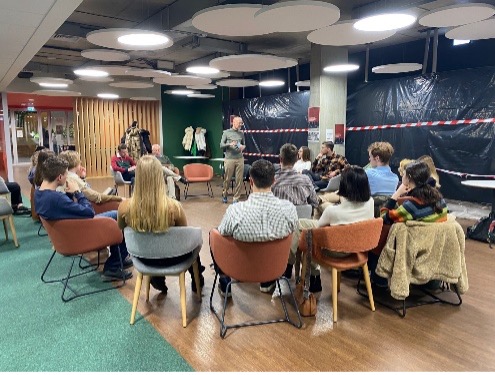Thought Leadership

by Diplomatic Council Member Jochen M. Richter
After months of preparation, I travel to Ukraine for my opening lecture at the Catholic University in Lviv about EU integration. The country’s civil society is keen to learn what their path to the EU means and how they can accompany this complex process.
The bus from Warsaw passes the border into Ukraine close to midnight. Though one forgets what real border control are, including no-man’s land in between, travelling mostly within the Schengen area, it goes quite smoothly. That looks rather different a few days later leaving the country. Besides three unforeseen checks on the way to the border, we get stuck for good 6 hours.
A friendly professor from the Catholic University picks me up at the bus station. Longing for a beer after the long drive the first surprise. The gas station along the way is open, has a beer but can’t sell it. “It’s after 22h00, sorry”, he shrugs his shoulders.
The next morning watching out of the hotel room on campus one is inclined to copy the ignorant remark of a European Head of Government “Is there really war?”. Students are standing together chatting or laughing. Young women walk with push chairs. The university is rather new and so one sees very modern buildings, even a gym, other universities would get jealous. The church in the centre of the campus looks beautiful against the blue sky. But on the second look one cannot overlook that all cellar windows are protected by several layers of sandbags. Each building on the campus has clear signs where the closest shelter can be found. Just 200 meters away is another university building with clear signs of the war due to the impact of a Russian rocket some month ago. Fortunately, many students were not on campus at the time.
I get a guided tour and from a roof terrasse I see typical soviet style buildings around. The reason, I learn, is that Lviv has buildings from each of the soviet periods, from Stalin to Brezhnev, all hosting at the time military or secret police forces. Underneath today’s campus is a web of underground tunnels. Where the campus is the central of that oppressive system was foreseen but history went over this plan.
Just before meeting the rector of the university, we want to grab a sandwich, but a first air alarm destroys that plan. While also my phone announces the news, I see everybody calmly checking something. And my host states that the danger is still far enough away, and we should see whether prior to the meeting the secretariat can offer us a coffee.
Such alarms become even for me routine over the coming days, fortunately for me all during the day. I will be spared of running at early morning hours to the shelter, which people in Lviv somewhat got used to. And I learn to check, how dangerous the situation is. However, any service including in restaurants is immediately interrupted if an air alarm goes off. Indeed, it wouldn’t be a good idea that crowds are running downstairs, and some have a cup of hot coffee in their hands.
Having some little time in between meetings, I explore the centre of Lviv. It shows a typical Eastern European city in transition. Trams from the last century next to very modern versions. Houses that state the historic routes of the Austro-Hungarian Empire, next to Soviet blocks, many houses already well refurbished including new windows, while others cry for intensive renovation. Embassies are heavily guarded by soldiers and even anti-tank barriers are visible here and there. Wherever there is cultural heritage such as on buildings or in churches they are protected by wooden or metal covers, to avoid destruction in case a bomb is not intercepted.
While my opening lecture, being attended by more than 70 participants across the country, is uninterrupted, the meeting with representatives of the city Council is quickly moved into the shelter room. The word resilience is often mentioned, and relevant projects are on the priority list.
While one realises this great resilience in many talks it is also clear what they are afraid off: a radical plan in case of a Russian success that was even publicised a while ago. It consists of the extinction of the Ukrainian heritage, culture, and language with mass assassinations for those running the state, deportations for the intelligence including professors and language teachers and russification for many more. I can see the fear in the eyes of my conversation partner.
On the flight back I have an Estonian war reporter next to me returning from Ukraine. He definitely saw worst pictures and has the bulletproof west and helmet under his seat.
It was an enlightening travel and I hope to return.
